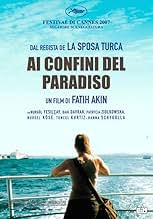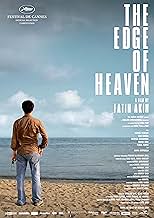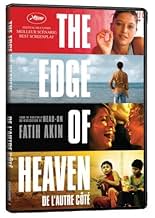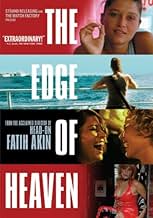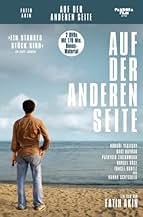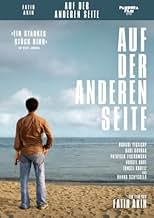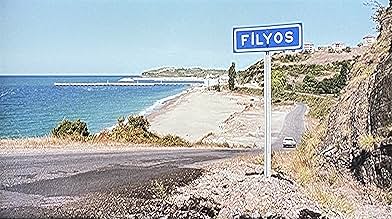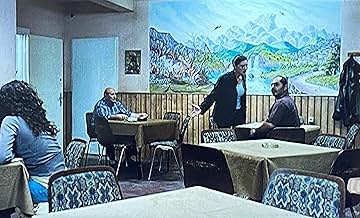IMDb रेटिंग
7.7/10
35 हज़ार
आपकी रेटिंग
अपनी भाषा में प्लॉट जोड़ेंA Turkish man travels to Istanbul to find the daughter of his father's former girlfriend.A Turkish man travels to Istanbul to find the daughter of his father's former girlfriend.A Turkish man travels to Istanbul to find the daughter of his father's former girlfriend.
- पुरस्कार
- 37 जीत और कुल 22 नामांकन
फ़ीचर्ड समीक्षाएं
A German filmmaker with Turkish extraction, Faith Akin's fifth feature, a Cannes' BEST SCREENPLAY winner, THE EDGE OF HEAVEN is a Bremen-Istanbul bilateral drama, unfolds in a triptych structure, delineates the vagaries of destiny and incidents impinged upon three parent- offspring pairs: a Turkish professor of German literature Nejat Aksu (Davrak) and his widowed pensioner father Ali (Kurtiz) living in Bremen, the latter, meets a middle-aged Turkish prostitute Yeter (Köse), and decides to pay her to live in with him as his exclusive possession, Yeter misses her daughter Ayten (Yesilçay) in Istanbul, whom she hasn't been in contact for years and later we will learn that she is now a young anti-government firebrand, the final pair is Lotte (Ziolkowska), a German college student who falls in love with Ayten and her mother Susanne (Schygulla), who doesn't quite approve of their lesbian romance and Ayten's radical political stance.
With each of the triptych respectively named as: Yeter's death, Lotte's death, and the eponymous The Edge of Heaven, Akin presages the tragedies in the first two segments like a hanging rock, leaving audience hooked by the impending demise, it is a bold move to dispel suspense and foreground the inevitability in its fair-paced narrative which evinces of Akin's more restrained sobriety over his material and the disparities underlying the two very different countries (both segments opens with protests, one in Bremen, another in Istanbul, their different after-effects tellingly betray Akin's political inclination). But, what renders wholesome of the film's slightly fortuity-heavy story is Akin's reflective and unflinchingly humane dissection of his dramatis personae, they are all the garden-variety type, each tries their best to get hold of their lives in the best possible way, and each is undermined by their foibles, but in its praise of love (Ayten and Lotte's intense love transcends their different mother tongues), family (Yeter's death separates Nejat and Ali, whereas Lotte's death unites Susanne with Ayten), understanding (Susanne's lofty gesture to the girl who obliquely causes the death of her daughter), and forgiveness (the childhood memory prompts Nejat to look for Ali in the end), that finale really vouches for the film's title, heaven is not afar in spite of there is turmoil prevalent on the surface, humanity can prevail.
Wonderful performances from the central sextet, in the (borderline) leading part, Davrak emanates an aura of soothing kindness often outdoes what he is required by the script and Turkish name-star Yesilçay mounts a great deal of rawness and bluntness in her deglamorized commitment, whereas Köse and Ziolkovska, due to their characters' preordained fate, are the ones to proffer ample sympathy. As for the two veterans, the late Turkish triple-threat Kurtiz trades on a spot-on brazenness of senescent loneliness and obstinacy, and Schygulla, staggeringly holds court as the redeeming soul who gets over from a sad bereavement and carries on with a positive vibe, which is so powerful and contagious, that fly-on-the-wall observation of her wailing in the hotel room is tremendously devastating to watch.
After his astounding one-two punch HEAD-ON (2004) and this, in retrospect, the following decade surprisingly hasn't panned out as a substantial acclivity for this wunderkind cineaste (he was only 34 at that time) as one might have postulated, his track record after THE EDGE OF HEAVEN is a lukewarm comedy SOUL KITCHEN (2009), an atrocious misfire THE CUT (2014) and his latest GOODBYE BERLIN (2016), almost gets no traction upon its release in the international front. Will Akin find his mojo back? It will be a crying shame if a filmmaker of his credentials cannot achieve something significantly great.
With each of the triptych respectively named as: Yeter's death, Lotte's death, and the eponymous The Edge of Heaven, Akin presages the tragedies in the first two segments like a hanging rock, leaving audience hooked by the impending demise, it is a bold move to dispel suspense and foreground the inevitability in its fair-paced narrative which evinces of Akin's more restrained sobriety over his material and the disparities underlying the two very different countries (both segments opens with protests, one in Bremen, another in Istanbul, their different after-effects tellingly betray Akin's political inclination). But, what renders wholesome of the film's slightly fortuity-heavy story is Akin's reflective and unflinchingly humane dissection of his dramatis personae, they are all the garden-variety type, each tries their best to get hold of their lives in the best possible way, and each is undermined by their foibles, but in its praise of love (Ayten and Lotte's intense love transcends their different mother tongues), family (Yeter's death separates Nejat and Ali, whereas Lotte's death unites Susanne with Ayten), understanding (Susanne's lofty gesture to the girl who obliquely causes the death of her daughter), and forgiveness (the childhood memory prompts Nejat to look for Ali in the end), that finale really vouches for the film's title, heaven is not afar in spite of there is turmoil prevalent on the surface, humanity can prevail.
Wonderful performances from the central sextet, in the (borderline) leading part, Davrak emanates an aura of soothing kindness often outdoes what he is required by the script and Turkish name-star Yesilçay mounts a great deal of rawness and bluntness in her deglamorized commitment, whereas Köse and Ziolkovska, due to their characters' preordained fate, are the ones to proffer ample sympathy. As for the two veterans, the late Turkish triple-threat Kurtiz trades on a spot-on brazenness of senescent loneliness and obstinacy, and Schygulla, staggeringly holds court as the redeeming soul who gets over from a sad bereavement and carries on with a positive vibe, which is so powerful and contagious, that fly-on-the-wall observation of her wailing in the hotel room is tremendously devastating to watch.
After his astounding one-two punch HEAD-ON (2004) and this, in retrospect, the following decade surprisingly hasn't panned out as a substantial acclivity for this wunderkind cineaste (he was only 34 at that time) as one might have postulated, his track record after THE EDGE OF HEAVEN is a lukewarm comedy SOUL KITCHEN (2009), an atrocious misfire THE CUT (2014) and his latest GOODBYE BERLIN (2016), almost gets no traction upon its release in the international front. Will Akin find his mojo back? It will be a crying shame if a filmmaker of his credentials cannot achieve something significantly great.
In his film The Edge of Heaven (2007), under original title Auf der anderen Seite (On the Other Side), Fatih Akin, a German writer-director of Turkish parentage, intertwines two stories, whose protagonists get caught in seemingly hopeless situations, both resulting in individual tragedies, stories with a cross section on the character of a young Turkish German professor, Nejat Aksu (Baki Davrak) whom we first meet living in Bremen and lecturing in the German literature university classes, who returns to Turkey, on a (futile?) quest for the lost daughter of his father's suddenly deceased girlfriend, and (unexpectedly?) stays there where he, quite appropriately to his vocation and interests, buys and maintains an Istanbul bookstore with exclusively German books (or books translated in to German) on offer, two stories which gradually approximate each other, but never actually "resolve" one in to another. Still, the end is open, with the possibility for resolution, future cleansing what-so-ever, of the souls heavily burdened with guilt from the past.
Film touches real life situations, ranging from usual family tensions and quarrels, through losses suffered due to physical separation or emotional disorder, all the way to ultimate loss, death of the dear one, and in doing so engages audiences on the first-person level, because nobody is spared from at least a single such experience, or two or more. Such an easy and deep identification with on-screen happenings, with how they develop, how they are mended or not... is what we feel all along, and what we carry out of the theatre when the film is over... Split between two sides, Life and Death on the edge, but who's to tell which side is the Heaven and which one is the Hell?
Heavy matters tackled, yet easy to relate to, feel for affected characters and empathize with them, in an emotionally charged and very engaging film.
Film touches real life situations, ranging from usual family tensions and quarrels, through losses suffered due to physical separation or emotional disorder, all the way to ultimate loss, death of the dear one, and in doing so engages audiences on the first-person level, because nobody is spared from at least a single such experience, or two or more. Such an easy and deep identification with on-screen happenings, with how they develop, how they are mended or not... is what we feel all along, and what we carry out of the theatre when the film is over... Split between two sides, Life and Death on the edge, but who's to tell which side is the Heaven and which one is the Hell?
Heavy matters tackled, yet easy to relate to, feel for affected characters and empathize with them, in an emotionally charged and very engaging film.
Faith Akin, renowned for his energetic movie 'Gegen die Wand', brings another story about the Turkish-German community. The movie focuses on three families who are all connected in some way. In a beautiful way Akin shows the struggle of a Turkish prostitute, a professor of German literature, a young Turkish rebel, a student English and Spanish and a retired widower to find peace and happiness in their lives. Akin manages to avoid the many pitfalls which can lead to clichés. The characters remain just ordinary people with genuine emotions and problems. The movie also depicts the impact of globalization and multiculturalism in nowadays Germany and Turkey. It's the most debated topic of our time. To what extent do we want newcomers to adapt to their new surroundings and to what extent do we accept them to cherish their own cultural heritage. In an even broader perspective, it deals with the clash between the Islamic and western world. 'Auf der anderen Seite', which means on the other side, shows how Turkish immigrants come to love their new country, Germany, without losing their Turkish roots. I think Akin invites us to try and imagine the backgrounds of people, so there will be less misunderstanding. This view is symbolized by Lotte, a German student, who decides to help Ayten, a Turkish political activist who fled Turkey. She doesn't know the Turkish girl but just wants to help her, because the girl has nowhere to go. This quest even brings her to the shores of Istanbul, a city where East meets West in the most literal way.
In the end, 'Auf der anderen Seite' is a story of love and hope which is most endearing and sheds a refreshing light on the global trend of clashing cultures. Any one who is interested in these topics and just loves a very well made movie, ought see this German-Turkish production!
In the end, 'Auf der anderen Seite' is a story of love and hope which is most endearing and sheds a refreshing light on the global trend of clashing cultures. Any one who is interested in these topics and just loves a very well made movie, ought see this German-Turkish production!
The Edge of Heaven
This is such a powerful, expansive, yet intimate movie about one of the things that matters most in our times, it's hard to fault it. The acting, the events, the setting, and implications of all these characters meeting and not quite meeting, suck you in. If it seems to have a lull now and then, you end up feeling the pace of their lives, and the pace of life itself. The events, even when they have a comic twist, are so heady and difficult they could make whole films each by themselves, but here they work through several related sections within a single tapestry.
As strong as the acting is, the core of the movie is the series of events, the plot. You'll see early on some coincidences beyond reason, making the plot almost Shakespearean, and therefore artful. The roles are each character are just a little surprising, just enough to keep us curious, yet each character represents a distinctive aspect of the crosscurrents of German and Turkish cultures and worlds, such as old people assimilating and young people refusing to assimilate. Even more than the mixing of Mexican and American worlds here in the U.S., this is a dramatic and more contentious melding, fraught with all those dangers of misunderstanding we hear in the news every day. Yet when it's brought down to the level of individuals, even seemingly unyielding ones, humanity wins.
I don't know how this film will carry itself in a couple decades. As well made as it is, it feels rooted in the moment, and when the times change yet again, there might be some kind of art or magic or transcendence missing to make it fully transport a viewer. It will remain interesting, but possibly less moving. But then, maybe the themes, of parents and children, of friends looking for who they miss and avoiding who they can't stand any more, might just be universal. But as a reflection of our world right now, 2009 (or 2007, when the movie was finished), it helped clarify just what life is like out there, beyond cinematic glitter and glam, beyond hyped up violence and romance. And beyond even the limitations of documentary in creating aura.
The Edge of Heaven happens to end with such lyrical highs, the name of the movie hits you hard. We are reminded of what exists beyond all the trappings that made so many people in the previous two hours so miserable, and it's there for us to tap into and to have in common, regardless.
This is such a powerful, expansive, yet intimate movie about one of the things that matters most in our times, it's hard to fault it. The acting, the events, the setting, and implications of all these characters meeting and not quite meeting, suck you in. If it seems to have a lull now and then, you end up feeling the pace of their lives, and the pace of life itself. The events, even when they have a comic twist, are so heady and difficult they could make whole films each by themselves, but here they work through several related sections within a single tapestry.
As strong as the acting is, the core of the movie is the series of events, the plot. You'll see early on some coincidences beyond reason, making the plot almost Shakespearean, and therefore artful. The roles are each character are just a little surprising, just enough to keep us curious, yet each character represents a distinctive aspect of the crosscurrents of German and Turkish cultures and worlds, such as old people assimilating and young people refusing to assimilate. Even more than the mixing of Mexican and American worlds here in the U.S., this is a dramatic and more contentious melding, fraught with all those dangers of misunderstanding we hear in the news every day. Yet when it's brought down to the level of individuals, even seemingly unyielding ones, humanity wins.
I don't know how this film will carry itself in a couple decades. As well made as it is, it feels rooted in the moment, and when the times change yet again, there might be some kind of art or magic or transcendence missing to make it fully transport a viewer. It will remain interesting, but possibly less moving. But then, maybe the themes, of parents and children, of friends looking for who they miss and avoiding who they can't stand any more, might just be universal. But as a reflection of our world right now, 2009 (or 2007, when the movie was finished), it helped clarify just what life is like out there, beyond cinematic glitter and glam, beyond hyped up violence and romance. And beyond even the limitations of documentary in creating aura.
The Edge of Heaven happens to end with such lyrical highs, the name of the movie hits you hard. We are reminded of what exists beyond all the trappings that made so many people in the previous two hours so miserable, and it's there for us to tap into and to have in common, regardless.
I usually comment on films right after I've seen them. However, "Auf der anderen Seite" (The Edge of Heaven), touched me in a way that few films do, so a month has passed.
This story of two sets of mothers and daughters, a father and his son...and a gun seems familiar, but its resolution is anything but. To lay out the plot would be daunting. So much ground is covered, yet it unfolds effortlessly. F a t i h Akin's screenplay is elliptical--the story starts where it finishes--but by the end, when the opening scene is replayed, our journey with these characters puts us, indeed, on the edge of transcendence.
Amid the desperation on display, small details brim over the images: a son waters his father's tomato plants pausing to taste the ripened fruit, a mother pits cherries that stain her fingers, another manicures her nails to avoid a quarrel, we imagine a bookstore's--specifically a German language bookstore in Istanbul--smell and the safety it can bring to a foreigner.... These domestic details are set against much larger, although finally insignificant, struggles: the cultural divide of immigrants, students revolting against an oppressive government, how imprisonment can deaden the soul. But F a t i h Akin wants the basic struggles of family bonds to be central here. It's the resolution of family rifts--small and large, emotional and physical--that are urgent.
The choice of settings, music, lighting... all carefully selected to build toward one moment that catches us off guard. When a foreigner asks "What is Kurban Bayrami?" (a Turkish holiday) the many seemingly disparate elements that we've been watching--in good faith because they're so rivetingly told--suddenly come together, it almost knocked the breath out of me.
Whether or not we as viewers have lost a father or mother or a child, through death, physical separation or emotional turmoil, we can understand what these characters suffer. And how all that can be healedthe willingness to have faith that good intentions can mend this troubled worldis something like a miracle to find illustrated on film. The weapons these characters lay down to pursue goodness don't necessarily have the effect they intend, but as we watch lives torn apart and then healed we see what they don't. And we carry that lesson out of theater with us.
This story of two sets of mothers and daughters, a father and his son...and a gun seems familiar, but its resolution is anything but. To lay out the plot would be daunting. So much ground is covered, yet it unfolds effortlessly. F a t i h Akin's screenplay is elliptical--the story starts where it finishes--but by the end, when the opening scene is replayed, our journey with these characters puts us, indeed, on the edge of transcendence.
Amid the desperation on display, small details brim over the images: a son waters his father's tomato plants pausing to taste the ripened fruit, a mother pits cherries that stain her fingers, another manicures her nails to avoid a quarrel, we imagine a bookstore's--specifically a German language bookstore in Istanbul--smell and the safety it can bring to a foreigner.... These domestic details are set against much larger, although finally insignificant, struggles: the cultural divide of immigrants, students revolting against an oppressive government, how imprisonment can deaden the soul. But F a t i h Akin wants the basic struggles of family bonds to be central here. It's the resolution of family rifts--small and large, emotional and physical--that are urgent.
The choice of settings, music, lighting... all carefully selected to build toward one moment that catches us off guard. When a foreigner asks "What is Kurban Bayrami?" (a Turkish holiday) the many seemingly disparate elements that we've been watching--in good faith because they're so rivetingly told--suddenly come together, it almost knocked the breath out of me.
Whether or not we as viewers have lost a father or mother or a child, through death, physical separation or emotional turmoil, we can understand what these characters suffer. And how all that can be healedthe willingness to have faith that good intentions can mend this troubled worldis something like a miracle to find illustrated on film. The weapons these characters lay down to pursue goodness don't necessarily have the effect they intend, but as we watch lives torn apart and then healed we see what they don't. And we carry that lesson out of theater with us.
क्या आपको पता है
- ट्रिवियाNurgül Yesilçay - who is a big star in her native Turkey - had doubts about taking on the part of Ayten as she wasn't sure how audiences would react to seeing her as a revolutionary lesbian.
- गूफ़In the film, the year is 2006 and it is the Festival of Sacrifices (Kurban Bayrami), a religious holiday. Everybody is in summer clothes and many of them are sweating. The Festival of Sacrifices in 2006 in Turkey was in winter, at the end of December.
- भाव
story: After telling the story of Abraham that was willing to sacrifice his son, Ismael, to show God his obedience. Before Abraham could slay his son God sent a lamb to sacrifice instead.
Nejat Aksu: I asked my dad if he would have sacrificed me as well.
Susanne Staub: And what did he say?
Nejat Aksu: That he would even make an enemy of God to protect me.
- क्रेज़ी क्रेडिटThe film's title appears twice: in the middle of the film at 1 hour 25 mins and after the end credits.
- कनेक्शनFeatured in Fatih Akin - Tagebuch eines Filmreisenden (2007)
टॉप पसंद
रेटिंग देने के लिए साइन-इन करें और वैयक्तिकृत सुझावों के लिए वॉचलिस्ट करें
- How long is The Edge of Heaven?Alexa द्वारा संचालित
विवरण
- रिलीज़ की तारीख़
- कंट्री ऑफ़ ओरिजिन
- आधिकारिक साइटें
- भाषाएं
- इस रूप में भी जाना जाता है
- The Edge of Heaven
- फ़िल्माने की जगहें
- उत्पादन कंपनियां
- IMDbPro पर और कंपनी क्रेडिट देखें
बॉक्स ऑफ़िस
- US और कनाडा में सकल
- $7,42,349
- US और कनाडा में पहले सप्ताह में कुल कमाई
- $14,257
- 25 मई 2008
- दुनिया भर में सकल
- $1,78,04,565
- चलने की अवधि
- 1 घं 56 मि(116 min)
- रंग
- ध्वनि मिश्रण
- पक्ष अनुपात
- 1.85 : 1
इस पेज में योगदान दें
किसी बदलाव का सुझाव दें या अनुपलब्ध कॉन्टेंट जोड़ें


